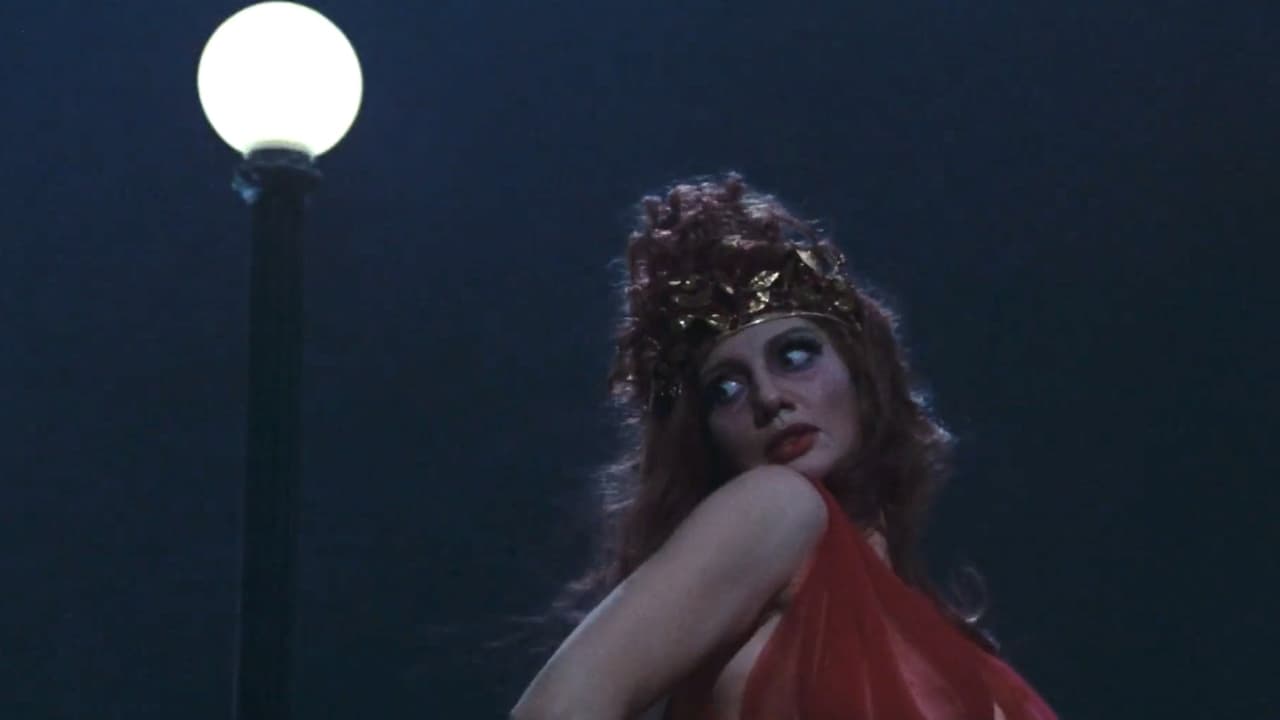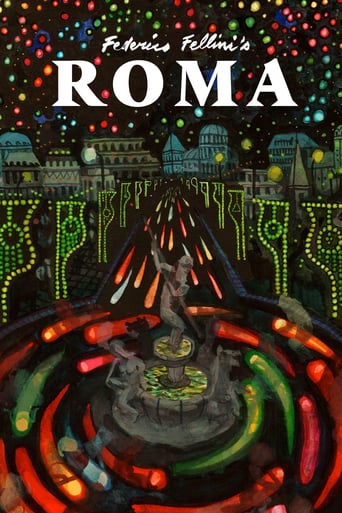Konterr
Brilliant and touching
Humaira Grant
It’s not bad or unwatchable but despite the amplitude of the spectacle, the end result is underwhelming.
Wyatt
There's no way I can possibly love it entirely but I just think its ridiculously bad, but enjoyable at the same time.
stormhawk2018
Millennial Rome, which has witnessed eras and eras, which has seen so many generations of human beings passing and has contemplated its greatness and its ignominy, continues standing, resurfacing constantly from its ashes, rising upon itself again and again. Who doubts that Rome is touched by the grace of the venerable and of what endures in the midst of chaos and change? It will not last forever, and someday it will be lost along with all that is here, the living and the inert ... But we can say that we have lived and lived, and Rome will have seen part of the parade of the aeons. Fellini, one of the most exalted, controversial and experimental film directors of the twentieth century, hunts to perfection that heroic resistance of the city, its halo of eternity coupled with daily life. Because Fellini was able to transfer to the celluloid, with that genius that is only granted to a few, the cyclical course of time, outlining with concrete lines concrete epochs and behaviors and lifestyles that strongly identify the Italian people and, by extension, what We are all in essence. Fellini always gets us to recognize ourselves in some gesture, some custom, some way of thinking, some way of conceiving life. Fellini was a philanthropist who loved every frame he shot, every bit of throbbing life that was etched into every inch of film. In short, he was able to capture his entire life in an instant. Wishing to pay his particular homage to his beloved Rome, his intimate Rome as well as universal Rome, Fellini filmed a testimony midway between documentary and autobiography, a historic, endearing, raw, sordid, painful and joyful legacy that perhaps Is one of the most realistic, surreal and beautiful films that have been filmed on the Eternal City.There is no more protagonist than the city itself and everything it contains. Through a few leaps in time, Fellini takes the camera through various places and enters the heart of the city, capturing the environments warmed by the severe heat of the Mediterranean, crowded with people of all conditions: resigned housewives loaded with children Crying and mischievous; Speechless men and brawlers; Entire families who rested from the hard daily chores at the movies and those Sunday dinners on the overcrowded restaurant terraces; Prostitutes who expose and punish their charms in a fleshly sale of meat; People who make a living acting in variety shows before a suburban and provocative public; The numerous teams of workers who left their skin in the titanic works of the Roman subway, a very complicated task hampered by the continuous discovery of archaeological remains in the strata buried beneath the city; The chaotic traffic, another protagonist more of the crowded city; Television crews and journalists who register their exuberant spirit; People of the high aristocracy slaughtered by the nostalgia of past splendor, already buried; The clergy, represented by its maximum figure, the Supreme Pontiff ... From surrealism to the most cruel realism, from the tenderness of the simplest to the ruthless coldness of war, from the beautiful to the grotesque, from praise to satire and ridicule, from pessimism to optimism, from the past until the present... Everything is concentrated in that Rome that laughs and cries and that breathes and that moves without ceasing. Who laments for the irretrievable, for the trampled vestiges of times that preceded us, for the ingratitude of time and neglect. Who shudders at the many human pains, unable to remain indifferent. What a fuss with the children's games. That ignites with unleashed passions. He is ashamed of the unthinkable and shameful. She prides herself. It beats at the rate of tachycardia. That is carried away by the hope of knowing that it will continue to dawn. Rome, the Eternal City, an explosive gift for the soul and the senses concentrated in two hours shot by a master who knew how to x- ray the carnality of the spirits.
Claudio Carvalho
"Roma" is a feature with neither plot nor timeline and composed by an edition of disconnected footages of Rome, the Eternal City. Fellini makes a homage to Rome and depicts and entwines moments of the ancient and the modern Rome, such as during the fascist period of Mussolini; building the subway; in a traffic jam; a fashion show for the Church members; brothels with clients and prostitutes on display; repression; ordinary people on the streets and restaurants. For fans of Fellini and Rome, this movie may be a must-see; otherwise, it may be boring and too long. My vote is five.Title (Brazil): "Roma de Fellini" ("Fellini's Roma")
ElMaruecan82
Whether for literature, theater or any art of storytelling, there can't be a plot without characters to drive it. Yet characters don't imply a specific plot and this might be the area where theater slightly surpasses literature, as an art of 'presence' and 'personalities' mirroring our condition. More than anything, it's a show, an invitation for eyes, for ears, for feelings. And emotions can do without plots.And here we have Fellini draining his talent from the Antic Roman-Greek tragicomedy, Commedia del' Arte, Opera and maybe more than anything, from his Italian roots so devoted to fun and entertainment. More than any other director, Fellini understood the virtue of Cinema as a new form of theater, a show that doesn't rely on plots or screen writing techniques, he shoots first and we ask the question later. And what a show! Fellini will forever be admired and never equaled, thanks to his unique talent to inhabit his films with unforgettable galleries of characters: eccentric, larger-than-life, decadent, greedy, gluttonous, sensual, ugly, outcast, colorful faces with anonymous names and universal and timeless appeals. These people feel real because they FEEL. And we're so hypnotized by the images that we forget to care about a plot.My repetition of the word 'plot' is only an anticipation of some rational comments on Fellini's "Roma" or, "Fellini's Roma", I must say. Yes, the film doesn't have a plot, even to those who set their minds for a surrealist tour orchestrated by the ultimate cinematic ringleader, Il Maestro Fellini. Even "8½" chronicled the very process of film-making from the author's boiling mind, even the previous "Fellini's Satyricon" was a take on a myth that had a story to tell, no matter how disjointed it felt. Even the nostalgic vignettes of "Amarcord" made a coherent ensemble, but "Fellini's Roma" has no focus whatsoever.But does it need one when the scope is so large, when Rome is the main protagonist? Rome... such a myth of a city that it transcends all the periods, visions and artistic possibilities. The film is constantly inhabited by Rome's aura from Fellini's perspective, hence the title. For "Satyricon", it was a legal necessity to distinguish from two films with the same title, to establish Fellini's independence from the original myth. "Roma" similarly establishes Fellini's independence, except that this time, no other vision of Rome could ever compete with Fellini's or approach the town with the same masterful audacity.Now, why a film about "Rome"? My guess is that it's one of the few privileged cities whose name evoke fascinating contradictions. "Rome is the city of illusions. Not only by chance you have here the church, the government, the cinema. They each produce illusions." This is Gore Vidal speaking in a memorable cameo and it's probably the closest rational conclusion that can come out of this mesmerizing mess. And "illusion" is the key word, whether it's the illusion of church that ignited the faith of generation of Italians without abjuring them from that lust for life and voluptuous bodies so rooted in the Italian lifestyle, for politics that have plunged post-War Italy into the darkness of fascism and yes, even Cinema doesn't escape criticism.Behind Fellini's eye, Rome oscillates between dazzling magnificence and nightmarish decadence. Fellini appears twice, as a young idealistic man who discovers the town, eats some spaghetti with the population, goes to the music-hall or visits a brothel, and the older real-life Fellini discussing with the new generation of Romans on how to make an accurate portrayal of the city. And it's ironic how nothing changed much between these times, "O Tempora! O Mores", yet Mussolini's Italy was as noisy, lusty and turbulent as in 1972, and ironically, "Roma"'s self-referential aspect illustrates the fact that both embellishment and derision rely on caricatures, the very illusions Fellini admits in his own filmmaking process.And illusion contributes to the film's most enigmatic moments: a parade of prostitutes tempting their clients, with sensual bodies to better hide the lucid tiredness in their faces, the scene followed by a sort of ecclesiastic fashion contest. Through the intriguing parallel, the iconoclast Maestro doesn't attack church but the myth of virtue that ignores the real sacred Trinity outside the Vatican border: life, love and lust. His fantasy vision works like a missing link between the eternal myth of Roma and reality. When thinking of Roma, we'll either have a vision of the Coliseum, of a fat Italian with huge bosoms serving a large plate of pasta on a summer evening, or maybe a beautiful red-haired and red-dressed woman sensually dancing at the moonlight of a lamppost, perhaps the greatest cinematic allegory of any town.And if the film works without characters, it does as well without a plot because Rome is that sensual woman with a history, a present, a future and a past. You can't dig a subway tunnel without bumping on archaeological relics hidden in its prolific womb, like a woman who hasn't revealed all her secrets. And one of the most poignant moments occurs when engineers find Antic frescoes in a tunnel, preserved just as if they were painted the day before, before oxygen destroys them instantly. That's the price you pay when you have a clear glimpse on reality, imagining how Romans were would have been more salutary for its (or her) own history. And this is the power of imagination, of illusion over reality or any myth of grandeur. No need for a plot when you have such a wonderful protagonist that encapsulates all the values Italians will forever stand for, and who more entitled than Fellini to share with us a part of his vision? And no need for specific characters when you have the Italians. A famous Italian actor, if I recall correctly, said something like "In Italy, there are about thirty millions actors, the rest of the population star in movies". This quote could have been the film's tag-line.
PWNYCNY
In this movie Federico Fellini attempts to contrast the Rome of his youth with modern day Rome with mixed results. The Rome of his youth is gaudy, earthy, raucous, but with a sense of community, while all that is lacking in the present day, yet Rome endures despite the changes. Fellini clearly yearns for the earlier time and provides a glimpse of a world and subculture that is now extinct. Oh, to go back to the days when neighborhoods existed, when people knew each other, when life was simpler and more fun. Yet the problem is that the movie lacks any real dramatic content. The movie is basically consists of anecdotal vignettes that show the ridiculous side of life, yet it's all based on caricatures that lack substance. As a result, the movie is dramatically flat. One can appreciate Fellini's attempt to recreate a happier bygone era but people are more than just caricatures and to portray people as such becomes a form of mockery which is ultimately unfair.

